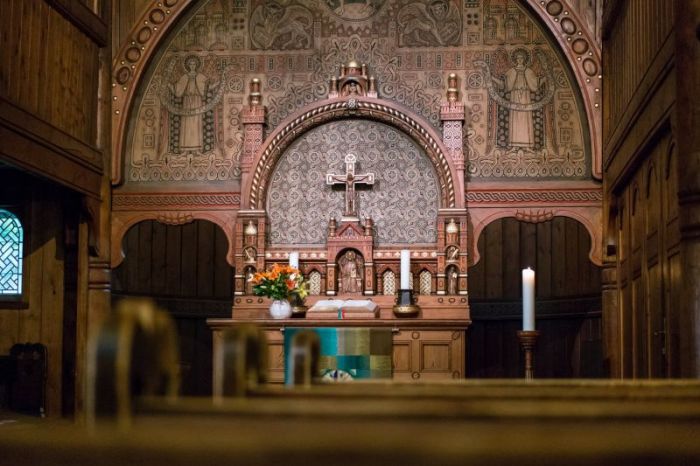Catholic School Students Less Likely to Act Out or Be Disruptive, Study Finds

A new study of federal data has found that elementary students who attend Catholic schools are less likely to act out or be disruptive in class and are more likely to exhibit self-control and self-discipline than students who attend public schools or other private schools.
The Thomas B. Fordham Institute, an Ohio-based charter school advocacy organization, has released a new report analyzing two waves of nationally representative data on elementary school students that purports to show how Catholic school students seem to fare better than other students when it comes to behavior and self-control.
The organization hired University of California, Santa Barbara Associate Professor Michael Gottfried and UCSB doctoral student Jacob Kirksey to analyze data collected by the National Center for Education Statistics. The study analyzed data from two longitudinal studies — one from 1999 and one from 2011.
The 1999 study contained data on kids entering kindergarten in the 1998-99 school year and followed them through the eighth grade. The 2011 study contained data on children who entered kindergarten in the 2010-11 school year and followed them through the fifth grade.
Both waves of data include interviews with and surveys of parents, teachers, and school administrators who spoke to the children's progress during those timespans.
"Where does self-discipline come from?" the study's introduction asks. "Certainly it comes in part from home, family, church and the other institutions of civil society. But schools can make a difference too, and over the years Catholic schools — the largest provider of private education in the United States — have been particularly committed to the development of sound character, including the acquisition of self-discipline."
The study seeks to examine how well Catholic schools' commitment to the development of character and self-discipline has worked out when it comes to shaping student behavior.
"[I]t would benefit all sectors of the education community to know whether children in Catholic schools actually exhibit more self-discipline than their peers," the study states.
The study's authors made three conclusions after reviewing the data.
The first conclusion was that students in Catholic schools are "less likely to act out or be disruptive than those in other private or public schools."
The authors explain that kids at Catholic schools exhibited fewer "externalizing behaviors" than their peers at other private schools.
"According to their teachers, Catholic school children argued, fought, got angry, acted impulsively, and disturbed ongoing activities less frequently," the study explains. "A similar pattern emerges when comparing children who attend Catholic school to those in public schools, though the differences are generally smaller and do not increase over time."
Although data from the first and second cohorts showed similar patterns of Catholic school students exhibiting fewer externalizing behaviors, the study admits that in the second cohort, "the difference between Catholic schools and other private schools disappeared between kindergarten and second grade."
The second conclusion the authors made was that Catholic school students "exhibit more self-control than those in other private schools or public schools."
The study shows that Catholic school students were more likely to control their tempers, respect the property of others, better handle peer pressure and were more willing to accept the ideas of their peers.
"Teachers at every grade level reported that students in the first cohort (1998–99) who attended Catholic schools exhibited greater self-control than those in other private schools," the report reads. "Like the difference in 'externalizing behavior,' this difference is smallest in kindergarten ..., though in this case there is no clear trend between kindergarten and fifth grade."
Catholic school students who entered in kindergarten in 2010-2011 also reportedly showed more self-control than students in other schools.
The third conclusion the authors made was that Catholic school students "exhibit more self-discipline than students in public schools and other private schools."
"Prior research suggests that Catholic schools do a particularly good job of boosting the achievement of low-income and minority students. Consequently, we tested for differences in the relationship between Catholic school attendance and externalizing behaviors and/or self-control based on individual characteristics, including race, gender, socioeconomic status, and family immigrant status, as well as initial behavior (as rated by kindergarten teachers)," the study reads. "Interestingly, there were no systematic differences between any of these groups."
Because of the data, the authors assert that "there is at least some evidence that attending Catholic school may benefit all sorts of children, at least when it comes to reducing the frequency of externalizing behaviors and fostering greater self-control."
The study, however, admits that the findings cannot be definitively labeled as "causal."
"Despite the authors' efforts to construct a plausible control group, there may be unobservable differences between Catholic and other private school students, so their estimates of the 'effect' of Catholic school attendance may be biased," the study reads. "Still, the findings suggest three key takeaways."
The study's three takeaways are
- "Schools that value and focus on self-discipline will likely do a better job of fostering it in children."
- "Assuming that these results reflect a 'Catholic Schools Effect,' other schools might consider both explicit and implicit methods to replicate it."
- "Don't underestimate the power of religion to positively influence a child's behavior. But in the absence of it, schools can adopt courses or programs that might foster self-discipline."
The report's authors asserted that the findings about Catholic school students don't necessarily "mean that such secular approaches" and schools "don't have their place."
"Of course they do. And so do character education, ethics classes, and civics, all of which can contribute to the development of self-discipline. School leaders should choose the options that best suit their kids and culture."




























